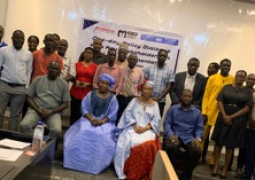
Dr Desta A. Tiruneh made this remark on Wednesday at the Senegambia Beach Hotel during a symposium as part of commemoration of the World Antimicrobials Awareness Week, from 18th – 24th November.
The theme for this year’s World Antimicrobials Awareness Week celebration for the human health sector is – ‘United to Preserve Antimicrobials’.
As resistance grows to a wider range of drugs, Dr Tiruneh maintained that WHO together with its partners the Food and Agriculture Organization of the United Nations and World Organisation for Animals Health (OIE) has broadened this year’s campaign focus from antibiotics to antimicrobials.
He noted that antimicrobials are the most frequently reported substandard and falsified medicines and these substandard products, he added, is a key driver of antimicrobials resistance.
Dr. Tiruneh disclosed that globally, one in 10 medicines is estimated to be substandard or falsified and the African region is affected more than other parts of world.
“In markets and on the street corners, people are buying antibiotics of un assured quality without prescriptions. WHO has declared that Antimicrobials Resistance is one of the top 10 global public health threats facing humanity,” he added.
“Governments, partners and the private sector can work together by investing in water and sanitation and hygiene infrastructure and limiting antimicrobials in livestock and aqua farming. Health workers should prescribe and dispense antibiotics only when indicated and limit the spread of infections by promoting good hygiene and sanitation practices.”
WHO country rep further stated: “We can do our share as individuals by only using antibiotics prescribed by a licenced health professional and completing the full prescribed course. We can also play a part by preventing infections and reducing the need for antibiotics by frequently washing our hands and covering our mouth when coughing or sneezing.”





